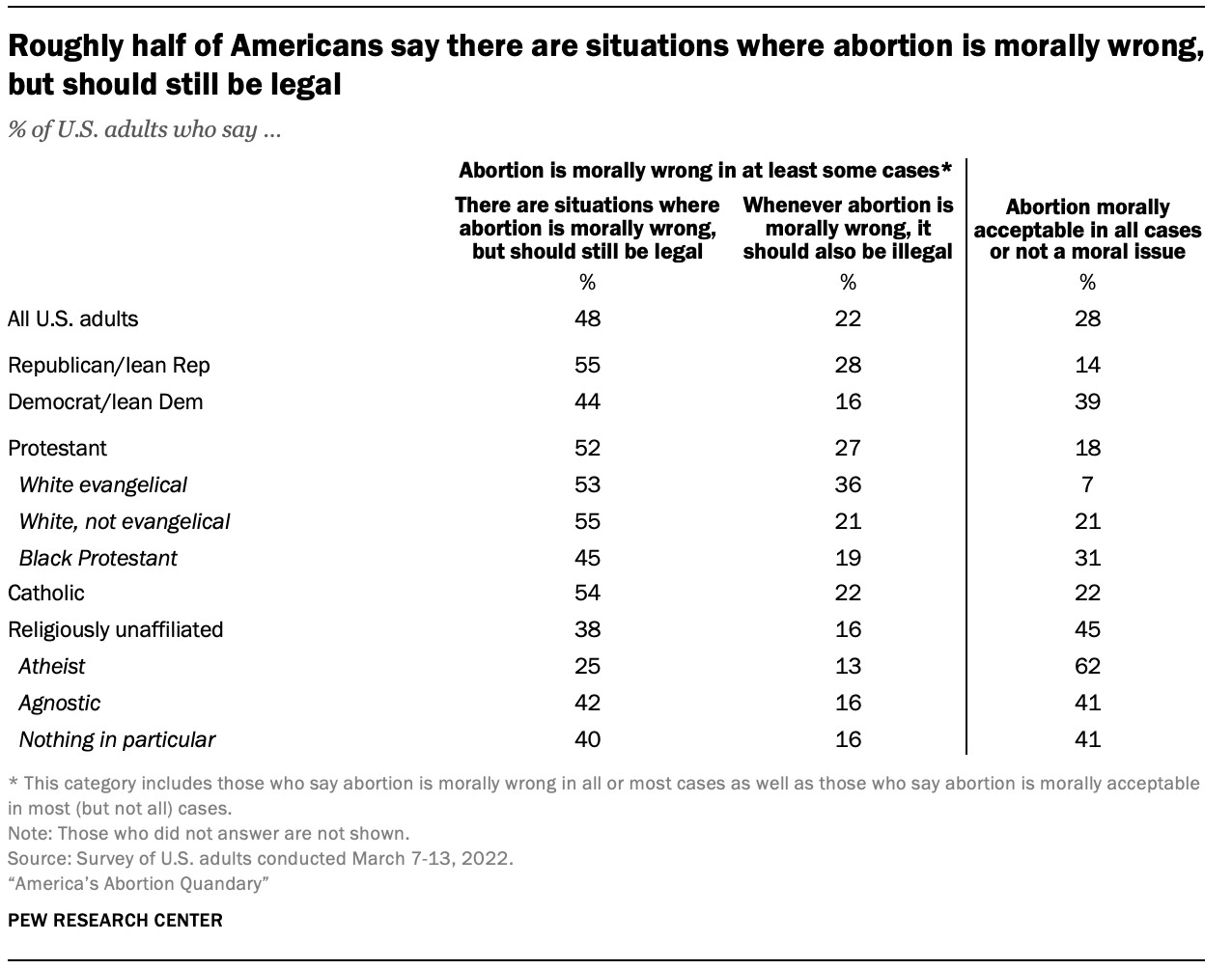Abortion remains a deeply divisive issue in the United States, with moral considerations playing a significant role in shaping public opinion. While the legality of abortion is a frequent topic of debate, understanding why many people view abortion as morally wrong is crucial for a comprehensive grasp of this complex subject. This article delves into the moral perspectives on abortion held by Americans, drawing on data from a recent survey by the Pew Research Center. By examining these views across different demographics and exploring the reasons behind moral objections to abortion, we aim to provide a nuanced understanding of this contentious issue.
Varying Moral Views on Abortion in America
Public opinion on the morality of abortion is far from monolithic. The Pew Research Center study reveals a spectrum of beliefs, with relatively few Americans holding extreme views.
Overall Moral Acceptability
According to the survey, only a small percentage of U.S. adults believe abortion is morally acceptable in all circumstances (7%) or morally wrong in all circumstances (13%). A larger proportion believes abortion is morally wrong in most cases (33%), while nearly a quarter consider it morally acceptable in most cases (24%). Notably, about one-fifth of Americans (20%) do not perceive abortion as a moral issue at all. This data highlights the complexity of the issue and the wide range of personal moral frameworks applied to abortion.
Political Divides
Political affiliation significantly influences moral views on abortion. Republicans and Republican-leaning independents are considerably more likely to view abortion as morally wrong. A majority of Republicans believe abortion is morally wrong in most (48%) or all cases (20%). In contrast, Democrats and Democratic-leaning individuals are less inclined to see abortion as a moral wrong. Only about 29% of Democrats consider abortion morally wrong in most or all cases. Instead, a substantial portion of Democrats find abortion morally acceptable in most (32%) or all (11%) cases, or do not consider it a moral issue (28%). This partisan divide underscores how political ideology shapes moral frameworks related to abortion.
Religious Affiliations
Religious beliefs also play a critical role in shaping moral views on abortion. White evangelical Protestants stand out as overwhelmingly considering abortion morally wrong in most (51%) or all cases (30%). Catholics, while more varied in their views, also lean towards considering abortion morally wrong, with 53% holding this view. However, a significant portion of Catholics also find abortion morally acceptable in most (24%) or all cases (4%), or do not see it as a moral issue (17%). Religiously unaffiliated Americans are the most likely group to view abortion as morally acceptable (45%) or not a moral issue (32%). These differing perspectives across religious groups demonstrate the influence of religious doctrine and values on moral judgments about abortion.
The Link Between Morality and Legality
The survey reveals a strong correlation between moral views on abortion and opinions on its legality. Individuals who believe abortion should be illegal in all cases are highly likely to also view it as always morally wrong (86%). Conversely, those who advocate for legal abortion in all circumstances often believe abortion is not a moral issue (44%), although a significant portion also see it as morally acceptable (27% in all cases, 22% in most cases). This alignment suggests that moral convictions strongly influence beliefs about abortion’s legal status.
For those who believe abortion should be illegal with some exceptions, the prevailing moral view is that abortion is morally wrong in most cases (69%). Those who support legal abortion with exceptions hold more diverse moral views. While 43% find abortion morally acceptable in most cases, 26% consider it morally wrong in most cases, and 24% do not see it as a moral issue. This nuanced perspective among those who support exceptions highlights the complexity of navigating moral and legal considerations simultaneously.
It’s also notable that even among those who consider abortion morally wrong in at least some cases, a significant portion (48%) believe there are situations where abortion should remain legal. Only 22% believe that if abortion is morally wrong, it should always be illegal. This finding suggests a recognition that legal restrictions may not always align perfectly with personal moral convictions, even among those who have moral reservations about abortion.
A significant portion of Americans believe that while abortion can be morally wrong, it should still be legal in certain situations.
Factors Influencing Abortion Rates: Differing Perspectives
The survey also explored public perceptions of various policy changes and their potential impact on abortion rates. A majority of Americans (65%) believe that increased support for pregnant women, such as financial assistance and employment protections, would reduce the number of abortions. Similar proportions believe that expanding sex education (60%), increasing support for parents (58%), making adoption easier (57%), and enacting stricter abortion laws (57%) would also lead to a decrease in abortions.
However, views on which measures are most effective vary across political and religious groups. White evangelical Protestants are more likely to believe that stricter abortion laws (74%) would reduce abortions, while religiously unaffiliated Americans are less convinced (48%). Conversely, religiously unaffiliated adults are more likely to believe that expanding sex education (69%) would be effective, while white evangelicals are less so (48%). Democrats are more inclined to support sex education and parental support as abortion-reducing measures, while Republicans favor stricter laws and easier adoption.
Interestingly, majorities across political and religious divides agree on the potential of increased support for pregnant women to reduce abortion rates. This suggests a possible area of common ground in a highly polarized debate, focusing on support systems rather than solely on legal restrictions.
Republicans are significantly more likely than Democrats to believe that stricter abortion laws would be effective in reducing the number of abortions in the U.S.
Arguments Against Abortion and Public Resonance
To understand the moral underpinnings of views against abortion, the survey examined how well certain arguments resonate with Americans. One key argument against abortion centers on the belief that “human life begins at conception, so a fetus is a person with rights.” Nearly four in ten Americans (38%) find this statement to reflect their views extremely or very well. This perspective is more prevalent among Republicans, Protestants (especially white evangelicals), and Catholics compared to Democrats and religiously unaffiliated individuals.
Another argument sometimes raised by those who seek to restrict abortion access is that “if legal abortions are too easy to get, then people won’t be as careful with sex and contraception.” About a third of Americans (35%) resonate with this statement. This view suggests a concern that easy access to abortion may disincentivize responsible sexual behavior and contraception use.
It’s important to note that while these arguments against abortion resonate with a significant portion of the public, they are less widely endorsed than arguments in favor of abortion rights, such as the emphasis on a woman’s autonomy and the dangers of unsafe abortions. However, the substantial number of people who agree with the “life begins at conception” argument underscores a core moral reason why many view abortion as wrong: the belief that it involves taking a human life.
Many Americans recognize the dangers of restricting legal abortion access, fearing that it would lead to an increase in unsafe abortions.
In Their Own Words: Reasons for Moral Opposition to Abortion
The open-ended responses in the survey provide further insight into the moral reasoning behind opposition to abortion. Among those who expressed disapproval of abortion, the most common reason was the belief that a fetus is a person or that abortion is akin to murder. This aligns directly with the argument that “life begins at conception” and highlights the sanctity of life as a central moral principle for many who oppose abortion. Some respondents also expressed concern that abortion is used too casually as a form of birth control, suggesting a moral objection to abortion as a method of family planning rather than in exceptional circumstances.
These personal accounts reinforce the quantitative data, revealing that moral objections to abortion are often deeply rooted in beliefs about fetal personhood and the value of life from conception. While public discourse often focuses on the legality of abortion, these underlying moral convictions are a critical component of the ongoing debate.
The belief that life begins at conception is a central tenet for many who morally oppose abortion, particularly among White evangelical Protestants.
Conclusion
Understanding why abortion is considered morally wrong by a significant portion of the American population requires acknowledging the complex interplay of personal beliefs, political ideologies, and religious doctrines. The Pew Research Center survey reveals that moral views on abortion are diverse and nuanced, with a spectrum of opinions beyond simple “pro-life” or “pro-choice” labels. While relatively few Americans hold extreme views on either end, a substantial portion considers abortion morally wrong in most or all cases, often driven by a belief in fetal personhood and the sanctity of life. These moral convictions are strongly linked to views on the legality of abortion and shape perspectives on policies aimed at influencing abortion rates. By examining the data and the reasoning behind moral objections to abortion, we gain a more comprehensive understanding of this deeply contested issue and the diverse values at its heart.
Source: Based on data from Pew Research Center

